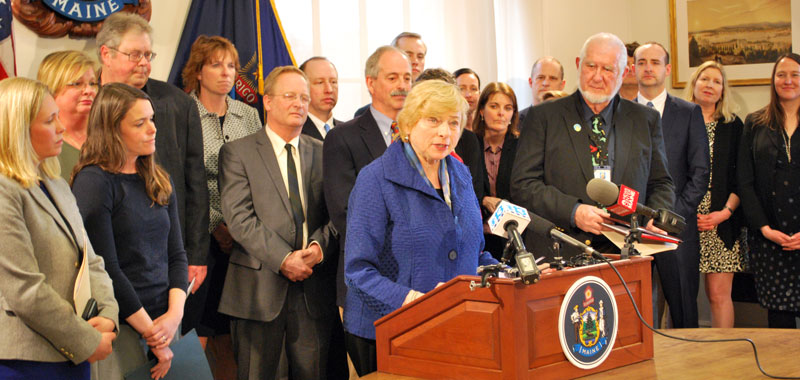Maine Governor Janet Mills has introduced bipartisan legislation to create the Maine Climate Council. The Climate Council will develop the action plan and timetable to meet the state’s greenhouse gas reduction goals, promote jobs, and economic benefits for Maine people in the transition to a lower carbon economy — and to support the climate resiliency of Maine’s communities.

The introduction of the legislation drew praise from the Maine Conservation Voters, Maine Renewable Energy Association, the Nature Conservancy in Maine, the Island Institute, Bigelow Laboratory for Ocean Sciences, the Margaret Chase Smith Policy Center, and the University of Maine’s Climate Change Institute.
“Evidence continues to mount that the impacts of climate change are harming our state and nation. Even the administration in Washington has joined the chorus of concerned scientists as the EPA last week warned,” said Governor Mills. “Today, we take another step in combating this threat, expanding our clean energy economy, and investing in our future by creating the Maine Climate Council and marshaling experts across the state to take urgent action.”
The Federal Environmental Protection Agency published a 150-page document (PDF) last week issuing climate change preparedness guidance for communities nationwide already struggling with severe natural disasters.
The Climate Council will consist of several department commissioners, key state leaders, science and technical experts, business and non-profit leaders, municipal leaders, a tribal representative, and a representative of Maine youth. It will be charged with leading Maine’s efforts to reduce Maine’s Greenhouse Gas emissions by 45% by 2030 and at least 80% by 2050, and with achieving 80% renewable energy in Maine’s electricity sector – specifically energy consumed in Maine – by 2030 and 100% by 2050.
The Climate Council will also convene several working groups from within its membership – including a Scientific and Technical Working Group, a Transportation Working Group, a Coastal and Marine Working Group, and others – to focus on how the state can tackle challenges within these specific areas. In addition to recommending new policy and innovative strategies to reach these emission and energy goals, the Council will update the Maine State Climate Plan every four years, and will solicit input from the public and report out progress on its goals every two years to the people of Maine.
The first Climate Action Plan is due to be submitted to the legislature by December 1, 2020.
“I look forward to working with the Legislature to pass this bill and ensure that the Climate Council can begin its work on building a better, brighter future for our state,” said Gov. Mills.
Filed Under: News, Policy




